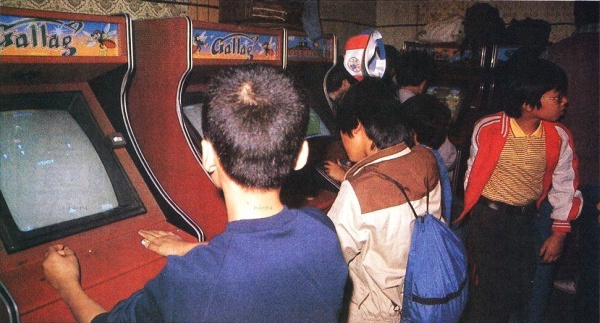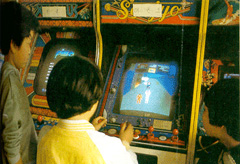1982 in South Korea was a strange time. The country was on the slow climb out of a long dictatorship into modern Democracy, massive industrialization and conglomerates dominated the economy and intense trade and cultural protectionism dictated the import/export of goods. Starting around the end of World War II, South Korea banned "cultural" imports from Japan -- this included video games. It wasn't until 1998 that the import restrictions were relaxed some. On top of this, a strict morality code dictated the kinds of cultural items that could legally find their way into the economy -- censors frowned on excessive violence and adult themes. To put this into perspective, one of the most highly promoted and popular shows on Korean TV during the 1980s was mullet wearing, gun eschewing, smart guy MacGyver.
This doesn't mean that video games were unknown in South Korea. On the contrary, building up the electronics industry in South Korea was a major strategic focus of the government and videogames are a major electronics business. A loophole in the law, conglomerates could license foreign technologies and build/market them in South Korea, allowed versions of many consoles to find their way into the Korean market. Still, these restrictions frustrated gamers and a huge illegal underground market flourished.
 Why all this about South Korea? Without the free flow of games from the booming Japanese games market, Korean gamers had to make do with what they could get. This skewed the history of that market in strange directions. Almost entirely unknown in the west, Ponpoko, known as 너구리 (Neoguri) in Korea, is widely regarded there as a classic game and had a welcome spot in most arcades, legal or not. As far as I can tell, it may have been more popular in South Korea than in its native Japan.
Why all this about South Korea? Without the free flow of games from the booming Japanese games market, Korean gamers had to make do with what they could get. This skewed the history of that market in strange directions. Almost entirely unknown in the west, Ponpoko, known as 너구리 (Neoguri) in Korea, is widely regarded there as a classic game and had a welcome spot in most arcades, legal or not. As far as I can tell, it may have been more popular in South Korea than in its native Japan.It's in South Korea that the game still lives on, a youtube search for "Ponpoko" yields a few results. A search for "너구리" finds speed runs, remakes, reviews. In fact Ponpoko, as 너구리 (Neoguri) has been remade in South Korea again and again and again.
In the interest of even more context, 1982 was an interesting time in Arcade games. Just two years prior, in 1980, the first credited platform game ever was released -- Space Panic (though there's some dispute if Sega/Gremlin's 1978 Frogs owns this title). A year later, in 1981, Donkey Kong hit the market. In 1982, the market was flooded with platformers. Most of them were primitive, but a few stand out as all time classics: Donkey Kong Jr., Joust, Q*bert plus less regarded, but still popular: Popeye, and Jungle Hunt. It's no wonder that with massive heavy weights like that in the same arcade, poor Ponpoko just never really caught on in most countries. It's also interesting that a near clone of Ponpoko, heavyweight Atari's Kangaroo was also a 1982 arcade release and saw much wider release in the West.
As an early platformer, the influence of the 1981 platform games on Ponpoko is clear. In Ponpoko, you guide a little Tanuki around a single playfield made of platforms. Similar to both Space Panic and Donkey Kong, you move between platform levels via ladders. To advance you collect a number of food items. The food changes each level, likely inspired by Pac-Man from two years before. Bonuses come in the form of a Donkey Kong-like time bonus for fast completion and extra points from bonus jars spread throughout the level.
Hazards come in the form of enemies who crisscross their platform, tacks spread throughout the level, enemies hidden in the odd bonus jar and an important innovation, fall damage from falling off a platform.
The tacks, platform placement and an interesting two-level jump mechanic (the jump button does a small jump, forward + jump provides a flying leap) introduces one of the first appearance of a complex jump puzzle in gaming -- or at least is a big improvement over what was seen in Donkey Kong.
Because the enemies simply mill about and don't follow you, and the level layout stays the same from game to game, it plays like a reflex memorization puzzle. With the added incentive that the biggest scores come from beating the bonus timer, you want to play over and over to find more optimal paths through the level and learn the patterns. Interestingly, "pattern" is what this game calls it's progressively more difficult levels. Very unusual for 1982, there's tons of levels -- 20 at my count.
Your tanuki has no offensive weapons at all. The game is purely an agility exercise and reminded me in many ways of 1984's Impossible Mission. The combination of the bonus timer, easy memorization, jump puzzles and level count in addition to fun graphics and little reward tunes make Ponpoko downright addictive.
So what are the problems with Ponpoko? For one, it's working off of, by 1982 standards, outdated Pac-Man hardware. Enemies may have 2 frames of animation, and your character has maybe 5. The character designs and music are also not very memorable. To most players, the enemies and the main character are virtually unrecognizable.
Control and hit detection are also a little fussy. The tanuki jumps with a difficult to gauge animation making even simple obstacles like tacks into life threatening weapons of death. Worse yet, guessing which jumps between platforms you can make and which are just a hair too far is impossible without pure trial and error.
I think that if Ponpoko had been released in 1981, we'd remember it today as an all-time global classic, have disco songs about it, cartoons, and people would recall fondly going on a date at the local roller rink and stopping to play a few rounds. But in the fast moving and ultra-competitive arcade market of the early 1980's the only place it seems to have really caught on is in illegal arcades in a South Korea winding it's way out of occupation, war and dictatorships.
Further reading:
Mamedb's game page
Hardcore Gaming 101's incredible History of Korean Gaming
Hardcore Gaming 101's discussion board
A modern flash remake
An emulab discussion about permissible games in Korean Arcades
MAME Puckman driver source code
Arcade Archives review of Ponpoko





No comments:
Post a Comment